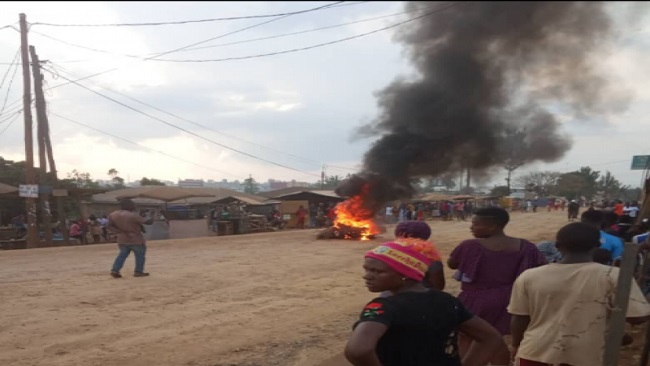24, February 2022
Russia attacks Ukraine amid international outcry, reports of first casualties 0
Russian troops launched a wide-ranging attack on Ukraine on Thursday, as President Vladimir Putin cast aside international condemnation and sanctions and warned other countries that any attempt to interfere would lead to “consequences you have never seen”. World leaders decried the start of a long-anticipated invasion with far-reaching consequences and reports of casualties on both sides. Follow our live blog for all the latest developments.
Russian President Vladimir Putin on Thursday announced a military operation in Ukraine, in a surprise televised address shortly before 6am local time. He warned other countries that any attempt to interfere with Russia’s invasion would lead to “consequences they have never seen”.
Explosions were heard in Kyiv, Kharkiv, Odessa and other Ukrainian cities. Interfax Ukraine reported rocket attacks on military facilities throughout the country, as well as staff and passengers evacuating Kyiv’s Boryspil airport.
US President Joe Biden, UN Secretary-General Antonio Guterres, NATO chief Jens Stoltenberg, French President Emmanuel Macron and other international leaders swiftly condemned the attack.
Ukrainian President Volodymyr Zelensky released an emotional video address early Thursday morning local time, appealing to Russians not to support a “major war in Europe”.
The EU on Wednesday imposed sanctions on Russia’s defence minister Sergei Shoigu and military chiefs as part of a package of measures over the Kremlin’s recognition of two separatist Ukrainian regions as independent.
Source: France 24





























24, February 2022
Oil prices soar, stock market slumps as Russia invades Ukraine 0
Oil prices broke above $100 a barrel for the first time since 2014, stock markets slumped and the rouble hit a record low on Thursday after Russian President Vladimir Putin launched an invasion of Ukraine.
Markets displayed all the predictable reactions. Europe’s main stock markets opened 2.5%-4% lower and benchmark government bonds, the dollar, Swiss franc, Japanese yen and gold all rallied in a move to safety.
Putin said he had authorised what he called a special military operation and the Ukraine government accused Moscow of launching a full-scale invasion.
The United States and its allies will impose “severe sanctions” on Russia after the attacks, U.S. President Joe Biden said. Europe’s leaders said they would freeze assets and shut Russian banks out of its financial markets. Russian and Ukraine markets went in freefall.
The rouble weakened nearly 7% to an unprecedented 86.98 per dollar and there were 10% plus falls on the Moscow stock exchange when it opened after an initial suspension. The Russian central bank then ordered a ban on short selling and over-the-counter markets until further notice.
The equities rout had started with a 2.6% dive for pan-Asian indexes. Europe’s STOXX 600 index then fell 2.75% – hitting its lowest since May 2021 and 10% below a January record high.
The German DAX fell 3.7%, bearing the brunt of the sell-off due to heavy reliance on Russian energy supplies and the amounts its companies sell to Russia. The surge in oil prices helped limit losses on the UK’s commodity-heavy FTSE 100, although it still slumped 2.3% and futures markets pointed to similar falls for Wall Street later.
S&P 500 e-minis were down 2% and Nasdaq futures were 2.8% lower, which if it materialises, would confirm the tech-focused index it is in a so-called ‘bear’ market.
“In the past when you have had geopolitical flareups you tend to have a very volatile periods on markets then normalisation, but it’s difficult to assess when we will get that,” said LGIM portfolio manager Justin Onuekwusi.
The dollar index was up 0.5%, in the currency markets.
Assets have seen a sharp increase in volatility over the deepening crisis, with the Cboe Volatility Index, known as Wall Street’s fear gauge, up more than 55% over the past nine days.
Brent crude futures, jumped more than 3.5% to shoot past $100 a barrel for the first time since September 2014.
West Texas Intermediate leapt 4.6% to $96.22 per barrel, its highest since August 2014, while gold jumped more than 1.7% to hit its highest level since early January 2021.
That dive for safety also saw yields on Germany’s AAA-rated government bonds drop eight basis points to 1.139%, the lowest in three weeks.. the benchmark U.S. 10-year yield was down sharply too, going as low as 1.86% from its U.S. close of 1.977% before edging back up to 1.90%.
Investors have also been grappling with the prospect of imminent policy tightening by the U.S. Federal Reserve aimed at combating surging inflation. The question now is whether the conflict will give central bankers a reason to delay those moves or whether the further rise in energy priced could spur them on.
While expectations of an aggressive 50-basis-point hike at the Fed’s March meeting have eased, Fed funds futures continue to point to at least six rate hikes this year.
“Markets are now more adequately pricing in the risk of something horrific happening. That combined with the uncertainty is a horrible environment to be in. No one wants risk exposure when that’s floating around,” said Rob Carnell, head of Asia Pacific research at ING.
Source: REUTERS